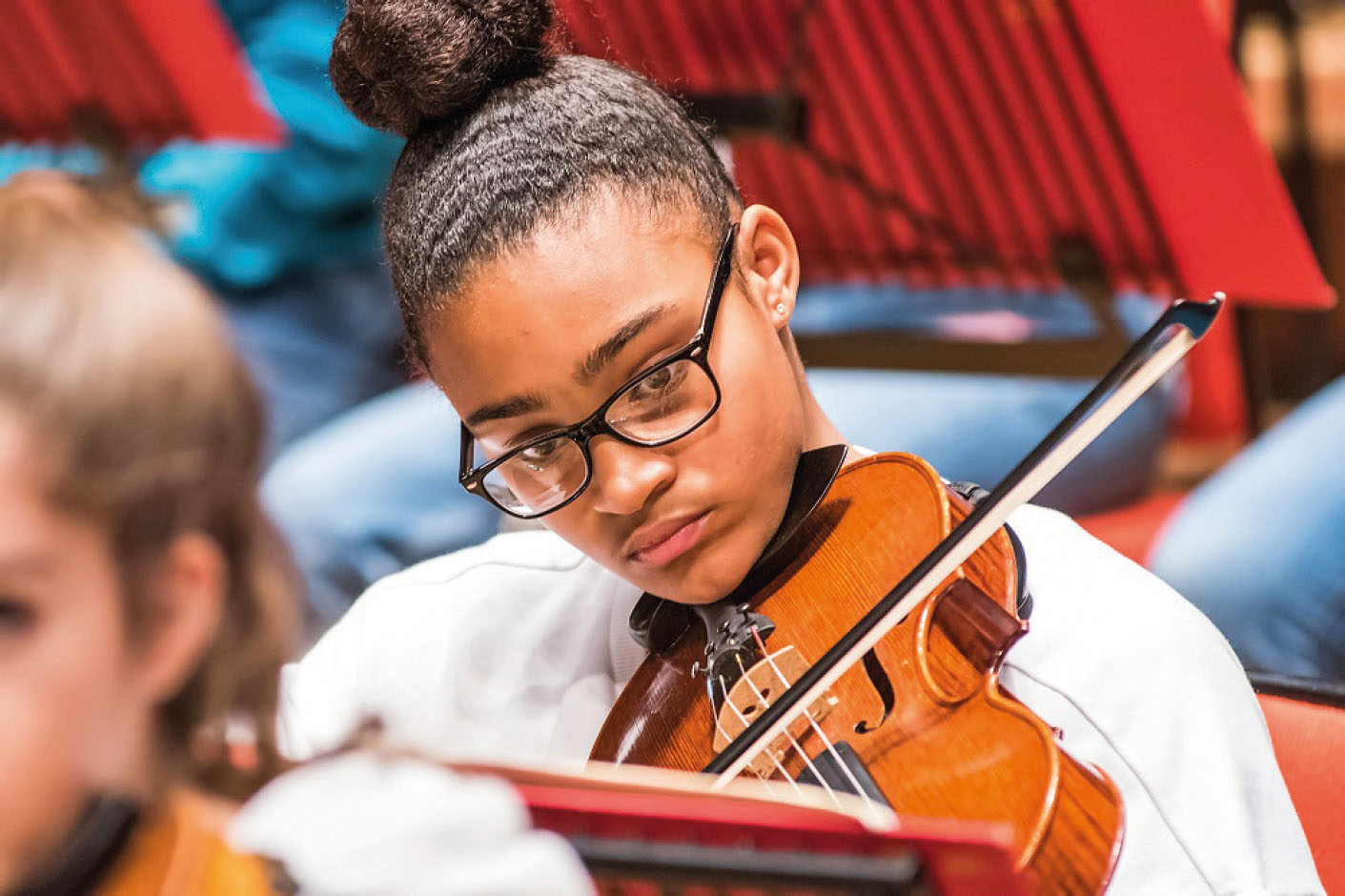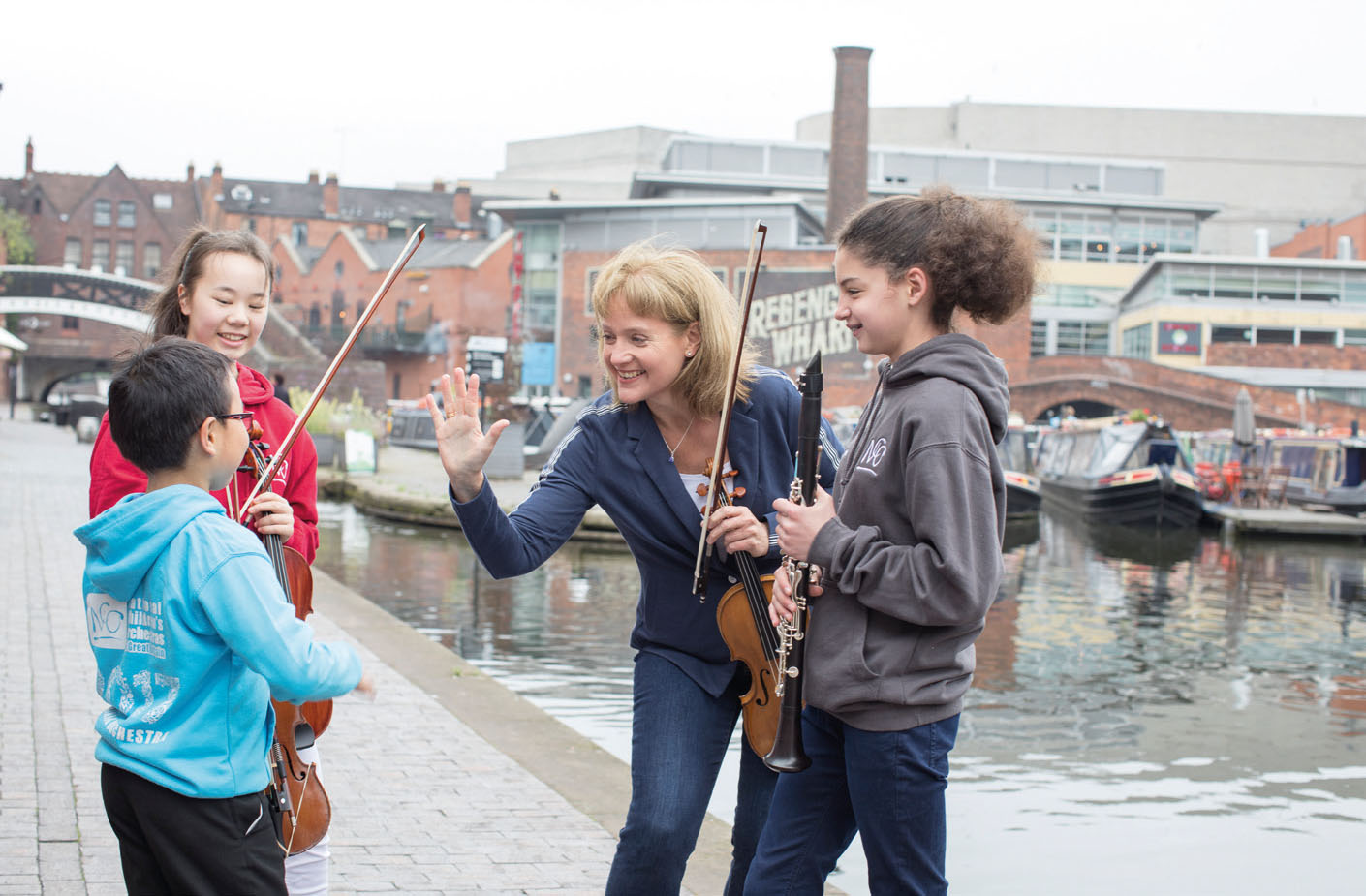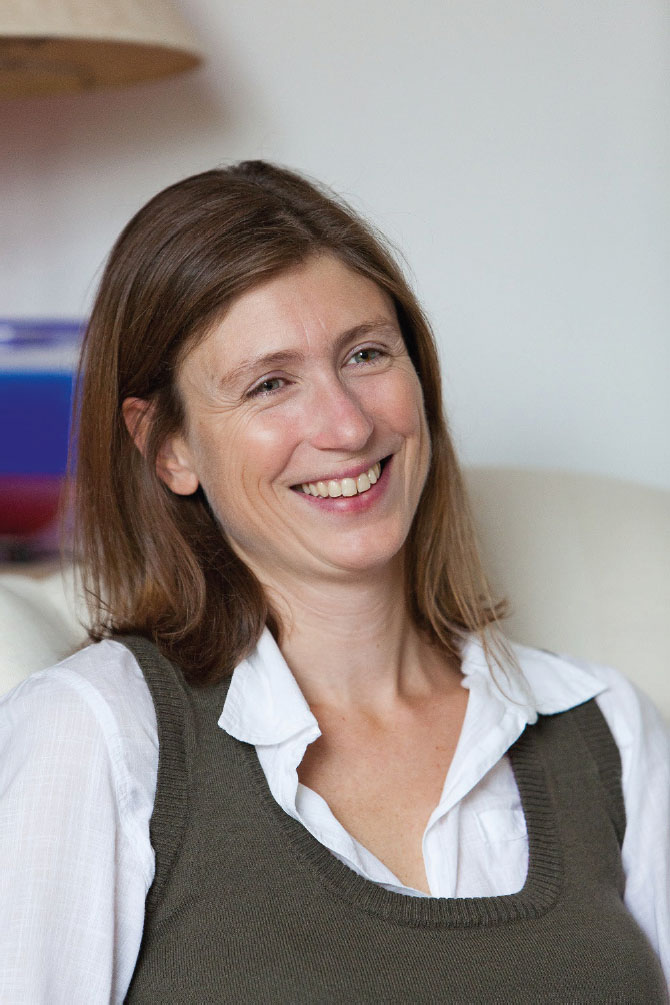
A transformation is taking place at the National Children's Orchestras of Great Britain. Following last year's appointment of new artistic director Catherine Arlidge (interviewed in MT October 2017), a new managing director has now been appointed: Sophie Lewis joined the NCO in February, having been chief executive of Welsh young professional chamber orchestra Sinfonia Cymru since 2006.
Lewis replaces previous managing director Carrie Sage with a mission to support the ambitious plans laid out by Arlidge. This new approach for the organisation is based on a curriculum with creativity at its heart, through four strands: artistry, mastery, autonomy and purpose.
At the time of her appointment, Lewis said it was ‘a huge honour to be given the opportunity to lead NCO at such an exciting time in its development. I am deeply passionate about the extraordinary benefits of music making for young people and can't wait be part of the next chapter of such a wonderful organisation that already does so much for young musicians.'
While at Sinfonia Cymru, Lewis received the inaugural Association of British Orchestras/Rhinegold Orchestra Manager of the Year Award after the orchestra became the first and only revenue funded chamber orchestra in Wales; she developed strategic partnerships with the Royal Welsh College of Music and Drama and the Young Classical Artists Trust; and launched a new working model, website and brand for the ensemble.
Peter Stark, chair of the NCO's trustees, described Lewis's track record at Sinfonia Cymru as ‘truly impressive’. He continued: ‘Sophie will be building on already secure foundations, and this formidable team will provide the talented children of this exceptional organisation with an even stronger learning and performing experience.’
Learning curve
So how has Lewis found the first six weeks in the role? ‘It's been a learning curve, because this is a children's charity: so I've moved from a professional chamber orchestra to a children's music organisation which reaches 700-plus children nationally. It's getting used to the scale of it; getting used to the difference in working with children and families; and to a larger team. It's been fascinating and inspiring. And daunting – maybe don't put that!
‘Before I got the role I saw the under-11s orchestra perform, and I went to the winter concerts once my appointment had been announced. I was at Symphony Hall where I saw the under-13s and the main orchestra share a platform. I saw two 100- or 110-player orchestras share a concert – 200-plus children – and I've seen the operational scale that's required to make that work. The under-13s played the suite from Rosenkavalier and I was blown away by the level of playing, particularly when they'd only rehearsed for a day and a half. I closed my eyes and just thought: “Wow – none of the people playing is over the age of 14”.’

The NCO's Winter Concert 2017, at Symphony Hall Birmingham
She has been ‘listening a lot, getting to know how this massive operation works, and getting my head around the planning cycle, because we work in calendar years of auditions, courses and concerts,’ as well as identifying ‘where the NCO sits in the educational offer for young people of this age: I've been starting to have conversations in new regions that we currently don't reach, particularly Scotland and Wales; and I've been attending some of the regional rehearsals, getting to know some of the families.
‘It's been quite logistical – seeing how the organisation and the team works – but also looking for what else it could be doing for young people in regions where it doesn't currently reach. And, also, thinking about Catherine's vision and how that will play out.’
Leadership and partnership
Lewis describes her role as ‘to ensure that the organisation fulfils the remit of its founding mission – and specifically that I can bring the organisation forward, through positive change, under Catherine's artistic leadership’. In common with many working in music education, Lewis believes that ‘a lot of it will be about building partnerships’.
‘The NCO has not always historically worked in partnership,’ she says. ‘We currently have a good relationship with the Royal Northern College of Music, but we need to be looking at other higher education partners, talking to them about how we could work with their students; we need to be talking to music hubs to see where NCO could fill a gap; and we want to be talking to professional orchestras about how we might bring some of their expertise in, to build mentoring opportunities.’
Lewis and Arlidge's vision for the organisation will start to really take shape from 2019, she says, but hints will start to be seen sooner: for example, in February a partnership with BBC Ten Pieces was announced, which will see one of the current Ten Pieces being performed in all 15 of the NCO's concerts by the NCO's 12 national and regional orchestras. In all, 722 young instrumentalists will perform a piece of the Ten Pieces repertoire this year.
This partnership will also see the first shoots of what a new, child-led artistic direction for the NCO could look like: in a first for the NCO, a creative composition project inspired by Kerry

NCO players with artistic director Catherine Arlidge
Andrew's No Place Like will see the Under 13 Orchestra work with composer John Webb to create their own piece, No Place Like… NCO. ‘The NCO has never done anything like this before,’ says Lewis. ‘It's one example this year of getting the musicians involved in the creation of a new piece of music. Then in 2019 the curriculum ideas will start to come to fruition.’
Position, ambition
The changes at the NCO are part of a self-conscious repositioning of the organisation. Lewis says the overarching ambition of the new team, with Arlidge's curriculum and vision as its basis, is that the NCO becomes ‘the place where 7- to 14-year-olds from all backgrounds want to go, because it's creatively and musically exciting’.
Working with hubs and music services is an important part of this repositioning: ‘NCO hasn't ever worked properly with hubs. And we know that hubs are under pressure; and we also know that we want more people to apply to join NCO, from all over the country and from all backgrounds.
‘Although NCO offers financial assistance for parents, lots of people either just don't know about it or do, but feel it's not for them. One or the other. By working with music hubs we can increase our reach, and hopefully more people will be confident to apply to join us. Some of the perceived barriers, around the NCO being “elite”, could be broken down.’

‘I think it's important to say that the organisation and the NCO's board recognises that the organisation needs to move on in a positive way, and that it needs a stronger case for support. The board recognises that there are developments in music education – and in professional music-making – in the 21st century, and that the NCO needs to better reflect those. The board has made a choice and appointed us both to take it forward, because it is aware that the organisation is not as sustainable as it was.’
Reading between the lines, it is perhaps significant that the NCO does not currently appear on Arts Council England's list of National Youth Music Organisations (which are co-funded by the Department for Education). Running a large-scale organisation such as the NCO requires leaders to maintain as broad a range of funding as possible – Lewis references individual giving, trusts and foundations, corporate sponsorship, and the ‘very generous’ fact that ABRSM is supporting its 40th season this year. Essentially, the new, more creative and exciting NCO will require longer-term strategic funding relationships. It will be Lewis's job, with her team, to develop them – while creating a better case for further investment, from a variety of sources.
Sense of purpose
Lewis is excited about the partnership between the organisation's two new leaders. ‘I get to work with somebody I massively respect and admire,’ she says. ‘We have aligned visions.’
‘At Sinfonia Cymru where I was essentially chief executive but also had responsibility for the artistic programme; in this role I'm not making the specific programme choices, and I'm certainly not making the artistic choices around children, but there's still a crossover on the creative development of the organisation. Both of us will work on that, which for me is the perfect scenario: Catherine has the creative knowledge that I don't have, and I have the organisational and managerial knowledge that she doesn't have.
“The NCO's board recognises that the organisation needs to move on in a positive way, and that it needs a stronger case for support”
‘It's really nice to be able to work side-by-side with somebody rather than on your own. You can support each other.’
Finally, what is Lewis most looking forward to?
‘I'm most looking forward to No Place Like… NCO, because it will be fascinating to see how some of the children respond to it. What would be great is at the end of that there's a group of children who can say: I learnt something new about myself.
‘The reason I wanted this job was to spark curiosity. I feel like I did that at Sinfonia Cymru for young professional players, where they discovered things and challenged themselves. You've only got to think, with this number of young people… if they can learn something new that they didn't know before, that it's not only about being able to play a piece of music, then that's got to be the most exciting thing.
‘That motivates me even more than the music itself.’
Joining the NCO
Booking for NCO auditions opens in June, with audition slots allocated on a first-come, first-served basis. Applicants need to be 13 or under on 1 September to be eligible for one of the six regional and six national orchestras.
Means-tested bursaries are available, and ‘all you need is talent!’, says the NCO website. Nevertheless, there is always more to do, says Lewis: ‘We want to become even more accessible by increasing the amount of financial support that we're able to offer.’
Auditions consist of two prepared pieces and sight-reading. ‘The NCO experience is about enjoyment, and we want that to happen right from the start, at your audition.’ www.nco.org.uk/join-in/audition








